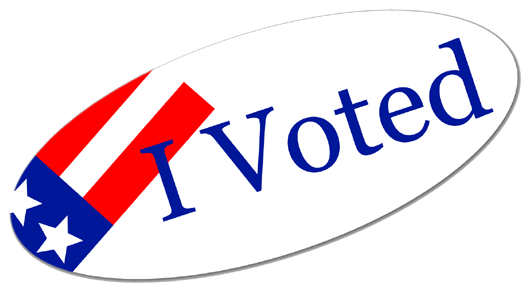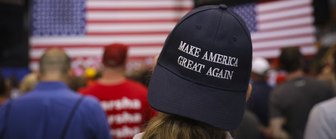While pundits and activists bemoan the consistently low levels of turnout in American elections, we as political scientists are perplexed by the millions of citizens that DO vote. On Tuesday, 42% of registered voters took time out of their day to travel to their assigned polling location, wait in line, exchange niceties with a grumpy volunteer, and fill in some bubbles with a Sharpie. What did they receive in return?: a sticker and a 0% chance of changing the results of the election.
Political scientists have tried to calculate the probability that one vote will make a difference in a Presidential election. They estimate that the chances are roughly 1 in 10 million to 1 in 100 million, depending on your state . This does not give an individual much incentive to vote. In a YouGov survey, we asked respondents to estimate the same probability. “If you vote in 2012, what are the chances that your vote will determine the winner of the Presidential election?” Some of the responses are illuminating.
Not surprisingly, Americans vastly overestimate the chances that their vote will make a difference. Our median respondent felt that there is a 1 in 1000 chance that their vote could change the outcome of a Presidential election, missing the true chance by a factor of 10,000. However, this dramatic overestimation does not explain the prevalence of turnout, because those who actually vote know that this probability is low. Over 40% of regular voters know that the chances of a pivotal vote are less than 1 in a million. Amazingly, turnout is negatively correlated with the perceived chances that one vote will make a difference—meaning the less likely you are to think your vote will actually matter, the more likely you are to vote.
If citizens realize that their vote won’t affect the electoral results, why do they vote at all? Is it the sticker?—In a way, yes. Citizens receive extrinsic benefits from voting that are unrelated to the chances that their vote will actually matter. We spent the Election Day talking to voters in two Boston suburbs. We asked them all a simple question, “Why did you vote?” Two-thirds of voters first mentioned extrinsic benefits while only one-third mentioned their concern for the results of the election.
“I always vote.” “It’s a civic duty.” “Many have fought for our right to vote.” “Voting gives you the right to complain.” These were the types of answers we received. Most voters made no mention of issues, candidates, or policies. When asked about whether their vote would change the election results, most acknowledged that the chances were low. Nonetheless, many held out hope saying, “You never know” or “The election could be close.” It appeared that most voters had never even thought of the chances that their vote would matter until we asked them, and some admitted so. This observation tells us a lot about why people vote. If forced to think about it, most voters know that they won’t change an election result; but they don’t care. They benefit from voting, regardless of the electoral outcome. Voters enjoy wearing stickers, expressing their views, fulfilling their civic obligation, and earning the right to complain. For them, that’s reason enough.
We met one inspiring gentleman who claimed to have voted in every election since 1954. Several years ago, a knee surgery coincided with a minor primary election date, putting his lifelong streak at risk. Not to be hindered by physical condition, medical professionals, or that he was wearing only a hospital gown, he informed the doctor that he would like to take a stroll in the hallway. Upon receiving approval, he made a mad dash to the parking lot where his wife was waiting with the getaway car. They quickly drove to the polling location where our pants-less protagonist could vote and return to the hospital before anyone noticed. And who did our hero vote for? Well, that’s not the point.
(The estimate of 1 in 10 million to 1 in 100 million comes from: Gelman, Andrew, Gary King, and John Boscardin. 1998. Estimating the Probability of Events That Have Never Occurred: When Is Your Vote Decisive? Journal of the American Statistical Association 93(441):1-9.)










